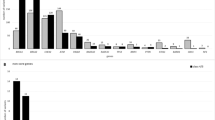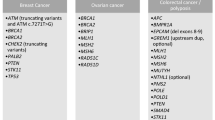Abstract
Cancer treatment is increasingly evolving toward personalized medicine, which sequences numerous cancer-related genes and identifies therapeutic targets. On the other hand, patients with germline pathogenic variants (GPV) have been identified as secondary findings (SF) and oncologists have been urged to handle them. All SF disclosure considerations for patients are addressed and decided at the molecular tumor boards (MTB) in the facility. In this study, we retrospectively summarized the results of all cases in which comprehensive genomic profiling (CGP) test was conducted at our hospital, and discussed the possibility of presumed germline pathogenic variants (PGPV) at MTB. MTB recommended confirmatory testing for 64 patients. Informed consent was obtained from attending physicians for 53 of them, 30 patients requested testing, and 17 patients tested positive for a confirmatory test. Together with already known variants, 4.5 % of the total confirmed in this cohort. Variants verified in this study were BRCA1 (n = 12), BRCA2 (n = 6), MSH2 (n = 2), MSH6 (n = 2), WT1 (n = 2), TP53, MEN1, CHEK2, MLH1, TSC2, PTEN, RB1, and SMARCB1. There was no difference in the tumor’s VAF between confirmed positive and negative cases for variants determined as PGPV by MTB. Current results demonstrate the actual number of cases until confirmatory germline test for patients with PGPV from tumor-only CGP test through the discussion at the MTB. The practical results at this single facility will serve as a guide for the management of the selection and distribution of SF in the genome analysis.
This is a preview of subscription content, access via your institution
Access options
Subscribe to this journal
Receive 12 print issues and online access
$259.00 per year
only $21.58 per issue
Buy this article
- Purchase on Springer Link
- Instant access to full article PDF
Prices may be subject to local taxes which are calculated during checkout


Similar content being viewed by others
References
Sunami K, Naito Y, Aimono E, Amano T, Ennishi D, Kage H, et al. The initial assessment of expert panel performance in core hospitals for cancer genomic medicine in Japan. Int J Clin Oncol. 2021;26:443–9.
Raymond VM, Gray SW, Roychowdhury S, Joffe S, Chinnaiyan AM, Parsons DW, et al. Germline findings in tumor-only sequencing: points to consider for clinicians and laboratories. J Natl Cancer Inst. 2015;108:djv351.
Clark DF, Maxwell KN, Powers J, Lieberman DB, Ebrahimzadeh J, Long JM, et al. Identification and confirmation of potentially actionable germline mutations in tumor-only genomic sequencing. JCO Precis Oncol. 2019;3:PO.19.00076.
Garofalo A, Sholl L, Reardon B, Taylor-Weiner A, Amin-Mansour A, Miao D, et al. The impact of tumor profiling approaches and genomic data strategies for cancer precision medicine. Genome Med. 2016;8:79.
Miller DT, Lee K, Chung WK, Gordon AS, Herman GE, Klein TE, et al. ACMG SF v3.0 list for reporting of secondary findings in clinical exome and genome sequencing: a policy statement of the American College of Medical Genetics and Genomics (ACMG). Genet Med 2021;23:1381–90. [published correction appears in Genet Med. 2021; 23:1582–4]
Mandelker D, Donoghue M, Talukdar S, Bandlamudi C, Srinivasan P, Vivek M, et al. Germline-focussed analysis of tumour-only sequencing: recommendations from the ESMO Precision Medicine Working Group. Ann Oncol. 2019;30:1221–31.
Japanese Society of Medical Oncology, Japanese Society of Clinical Oncology, Japanese Cancer Association. Clinical practice guidance for next-generation sequencing in cancer diagnosis and treatment, edition 2.1. 2020. https://www.jsmo.or.jp/about/doc/20200310.pdf.
Frampton GM, Fichtenholtz A, Otto GA, Wang K, Downing SR, He J, et al. Development and validation of a clinical cancer genomic profiling test based on massively parallel DNA sequencing. Nat Biotechnol. 2013;31:1023–31.
Woodhouse R, Li M, Hughes J, Delfosse D, Skoletsky J, Ma P, et al. Clinical and analytical validation of FoundationOne liquid CDx, a novel 324-gene cfDNA-based comprehensive genomic profiling assay for cancers of solid tumor origin. PLoS One. 2020;15:e0237802.
Sunami K, Ichikawa H, Kubo T, Kato M, Fujiwara Y, Shimomura A, et al. Feasibility and utility of a panel testing for 114 cancer-associated genes in a clinical setting: a hospital-based study. Cancer Sci. 2019;110:1480–90.
Guidelines for the Communication Process in Genomic Medicine. Part 2: Specific principles of comprehensive germline genetic analysis using next-generation sequencing [Revised 2nd edition]. https://k103E_guidelines_part2_210908.pdf (Kyoto-u.ac.jp).
A document for consideration of secondary findings in tumor genomic profiling test (Ver1.0_20210816). https://www.amed.go.jp/content/000087774.pdf.
Mukai Y, Ueno H. Establishment and implementation of cancer genomic medicine in Japan. Cancer Sci. 2021;112:970–7.
Shirota H, Komine K, Takahashi M, Takahashi S, Miyauchi E, Niizuma H, et al. Clinical decisions by the molecular tumor board on comprehensive genomic profiling tests in Japan: A retrospective observational study. Cancer Med. 2022. https://doi.org/10.1002/cam4.5349. Epub ahead of print.
Klek S, Heald B, Milinovich A, Ni Y, Abraham J, Mahdi H, et al. Genetic counseling and germline testing in the era of tumor sequencing: a cohort study. JNCI Cancer Spectr. 2020;4:pkaa018.
Jalloul N, Gomy I, Stokes S, Gusev A, Johnson BE, Lindeman NI, et al. Germline testing data validate inferences of mutational status for variants detected from tumor-only sequencing. JCO Precis Oncol. 2021;5:PO.21.00279.
Kondo T, Yamamoto Y, Fukuyama K, Kanai M, Yamada A, Matsubara J, et al. Germline sequencing for presumed germline pathogenic variants via tumor-only comprehensive genomic profiling. Int J Clin Oncol. 2022;27:1256–63.
Steele CD, Abbasi A, Islam SMA, Bowes AL, Khandekar A, Haase K, et al. Signatures of copy number alterations in human cancer. Nature 2022;606:984–91.
Soussi T, Kato S, Levy PP, Ishioka C. Reassessment of the TP53 mutation database in human disease by data mining with a library of TP53 missense mutations. Hum Mutat. 2005;25:6–17.
Minamoto A, Yamada T, Shimada S, Kinoshita I, Aoki Y, Oda K, et al. Current status and issues related to secondary findings in the first public insurance covered tumor genomic profiling in Japan: multi-site questionnaire survey. J Hum Genet. 2022;67:557–63.
Hiromoto K, Yamada T, Tsuchiya M, Kawame H, Nanba E, Goto Y, et al. Challenges of secondary finding disclosure in genomic medicine in rare diseases: A nation-wide survey of Japanese facilities outsourcing comprehensive genetic testing. J Hum Genet. 2023;68:1–9.
Shimada S, Yamada T, Iwakuma M, Kosugi S. Physicians’ perceptions of the factors influencing disclosure of secondary findings in tumour genomic profiling in Japan: a qualitative study. Eur J Hum Genet. 2022;30:88–94.
Acknowledgements
The authors would like to thank all the physicians who attended our MTB meeting.
Author information
Authors and Affiliations
Corresponding authors
Ethics declarations
Competing interests
Dr. Ishioka has received scholarship (incentive) endowments from Takeda, Daiichi-Sankyo, Ono, Asahi-Kasei Pharma, Taiho, and Chugai, as well as a research grant from Hitachi and Riken Genesis. Dr. Ichikawa has received research grants from Chugai Pharmaceutical, Eisai, Healios, and Ono Pharmaceutical, outside the submitted work. All remaining authors have declared no conflict of interest.
Additional information
Publisher’s note Springer Nature remains neutral with regard to jurisdictional claims in published maps and institutional affiliations.
Rights and permissions
Springer Nature or its licensor (e.g. a society or other partner) holds exclusive rights to this article under a publishing agreement with the author(s) or other rightsholder(s); author self-archiving of the accepted manuscript version of this article is solely governed by the terms of such publishing agreement and applicable law.
About this article
Cite this article
Kawamura, M., Shirota, H., Niihori, T. et al. Management of patients with presumed germline pathogenic variant from tumor-only genomic sequencing: A retrospective analysis at a single facility. J Hum Genet 68, 399–408 (2023). https://doi.org/10.1038/s10038-023-01133-5
Received:
Revised:
Accepted:
Published:
Issue Date:
DOI: https://doi.org/10.1038/s10038-023-01133-5



